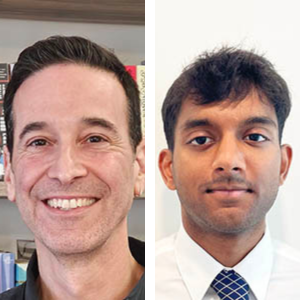Nishant D’Souza was in for a surprise when he joined his first Zoom meeting as a new Advocacy State Lead for the National Foundation for Ectodermal Dysplasias (NFED).
The University of Vermont medical student had only learned about the ectodermal dysplasias and the NFED earlier in the year. As advocates from around the United States began appearing on his screen, one face immediately stood out: his high school English teacher, Jonathan Weil!
Nishant assumed he wouldn’t remember him from 10 years ago. But, Jonathan not only remembered him but had two very specific memories from when he taught him honors English.
The two advocates recently reconnected to share how their paths unexpectedly have crossed again – this time in advocacy.
A Teacher’s Advocacy Journey
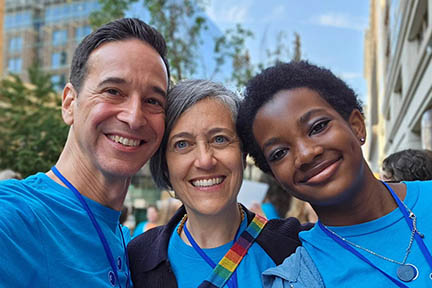
Jonathan was inspired to advocate for the Ensuring Lasting Smiles Act (ELSA) after his family attended the 2017 NFED Family Conference, a life-changing experience. His daughter, Maddie, who is affected by ectodermal dysplasia, was five years old. That year, the NFED took families to Capitol Hill to share their stories for the first time.
“I didn’t even know what we were going to do!” Jonathan said. “But, we made so many friends at the Conference and it felt like we were this team. And so that started to inspire me.”
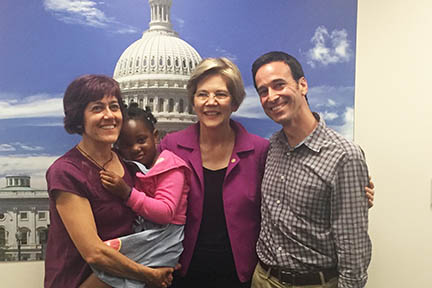
Jonathan wanted to model agency for his daughter and became the Advocacy State Lead for Massachusetts.
“It feels really important to say that you can take steps to effect change, however small; that you can collaborate with a cohort of other people to make something happen, to move the needle a little bit.
“The more I advocate, the more I see about how a democracy works. It’s messy, and it moves really slow, but I’ve learned the importance of little, day-to-day things like starting a conversation and following up on it. It was definitely scary at the beginning, and I still get nervous every time I have to do it. But getting over that hump and hearing people who were willing to tell their stories – there was just something inspiring about that.”
A Medical Student’s Path
Nishant’s road to advocacy began in medical school. While shadowing a dermatologist, he met a teenager affected by ectodermal dysplasia who struggled with dry skin and missing teeth.
Curious, Nishant researched the condition and discovered the NFED’s website. He had no idea that his former teacher had a child affected by ectodermal dysplasia.
Nishant reached out to Becky Abbott, NFED’s Director of Research and Special Assigned Projects, to ask how he could help with ELSA. He was hesitant since he was not affected by the disorder.
“I was excited by how welcoming everybody was,” Nishant said. “Becky told me they want to get as many people involved as possible. While I’m not affected by this condition as other people in the organization, there is definitely a way I can contribute as a medical student, someone who wants to go into the healthcare profession. Learning about it, advocating, and seeing people’s lived experiences, I feel like I can really make a difference at some point down the line.”
Nishant volunteers as the Advocacy State Lead for Vermont – a critical role in a state with few constituents.
“It can seem super intimidating when you see your role versus the whole healthcare system,” Nishant explained. “Can one person really make a difference? Something they always tell us is to think of it from a more micro perspective, rather than a macro perspective. What can you do in your day-to-day life to make a difference?”
Partnering for Change
ELSA is endorsed by more than 70 national healthcare professionals and patient advocacy organizations. If passed, the federal legislation would help individuals affected by ectodermal dysplasias and other congenital anomalies gain access to medically necessary care for the appearance or function of the eyes, ears, teeth, mouth or jaw. (Watch to learn more.)
“You take one specific condition and it affects a very small subset of the population, and there’s something that can be very isolating about that,” Jonathan said. “But, it’s that classic thing. You get a group of people together, like the people on the buses that went downtown to D.C. that day at Family Conference…my daughter got to witness that and see what that means. She was five so she mostly just held our hands and kind of trailed around and got tired.”
Now 13, Maddie is finding her own voice.

“Last summer in 2024, Maddie sat in meetings and told (U.S. Senator) Susan Collins of Maine, ‘this is my story’,” Jonathan recalled. “That’s big – this idea of how you can feel alone and you can feel isolated, but you very quickly see the power of community and building coalitions.”
Jonathan’s Tips for Advocating
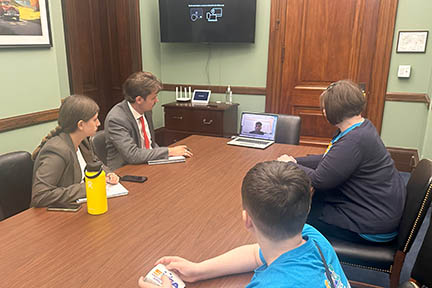

Nishant was recently preparing for his first virtual legislative meetings with U.S. Senator Peter Welch and U.S. Representative Becca Balint. His former teacher assured him that the people on Capitol Hill he’s met have all been respectful and friendly. It’s not like some of the intense congressional debates you may see on TV.
“You’re sitting with people who are there to listen,” Jonathan said. “You’re sitting around a table with families who just want to tell their stories. One of the things that I learned quickly is that you don’t have to get everything right and say everything right, and capture everything about it. Whether or not it immediately results in some kind of action, that’s where the process is tricky, slow and bumpy, and we just keep going. But when you’re in those rooms, it has been my experience that they feel very receptive and that makes it easier.”
Your Voice Matters
Jonathan and Nishant believe that every voice is needed to get this bipartisan, bicameral legislation passed.
“When Nishant said, ‘I was sort of on the outside, I’m not directly affected by it’, but that’s kind of part of it, right? You cast that net wider, and you have these conversations, and that’s when you start to see some movement, you start to see some change. At the very least, you see hope, and you feel less isolated and more connected.”
Register as an AdvocateGoing to the Hill to Advocate for ELSA
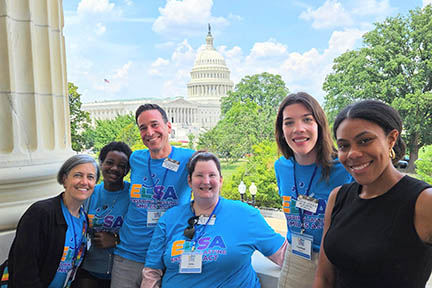
Jonathan and Nishant will reconnect in person on Capitol Hill when they attend NFED’s Advocacy Day on November 3-4. They invite you to join them! The NFED is looking for representatives from all 50 states to participate. Be sure to register by October 10. You can also apply for a travel and lodging stipend.
Register for Advocacy DayGet Involved and Advocate
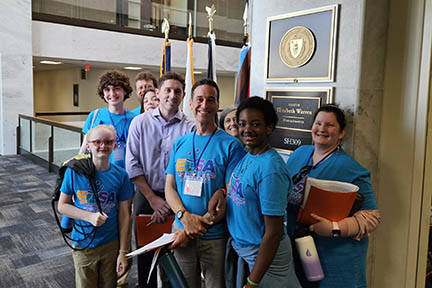
Jonathan has participated in numerous Hill Days whether they were virtual or in person. He always wonders how he can find the time to do it. But, once he does, he’s glad he had that opportunity.
“It feels really good to be on the call or in that room. It’s called State Lead, but it almost feels more like coordinating other people’s voices and there’s something really valuable to me about that. I really enjoy it. I feel like, here’s my story, but I’m part of a chorus.”
Interested in being an Advocacy State Lead? Contact Becky Abbott to learn more.
What If ELSA Passes?
Jonathan and Nishant are determined to help get this critical bill passed. And if it does?
“We throw a big party!” Jonathan said.
“Going forward, Maddie needs a lifetime of specialized care. We live in a democracy where there’s a responsibility to our citizens, that people should have access to the care that they need to live healthy and productive lives. And to know that if this gets passed, that it’s something that we could do, it just takes 5,000 pound weights off of our shoulders. All we want is access. And so, if ELSA provides that, that’s life-changing.”
Have a question or comment? Contact us.
